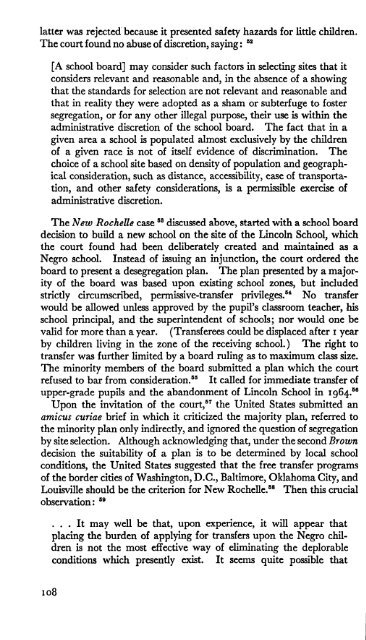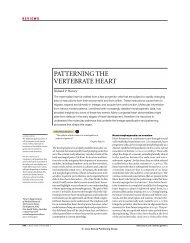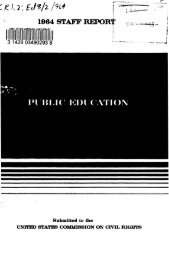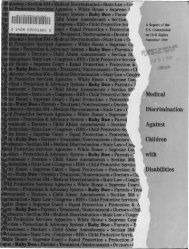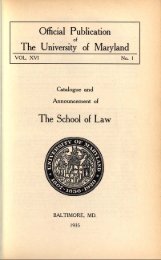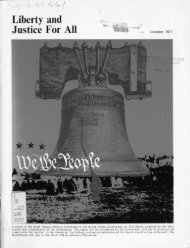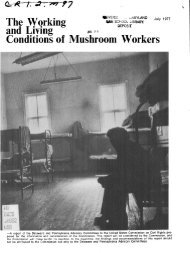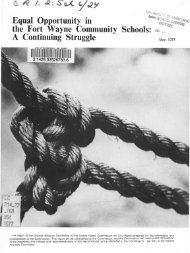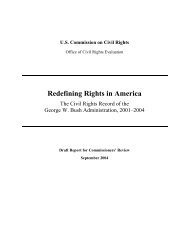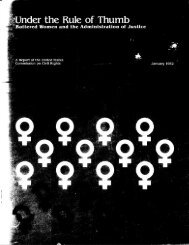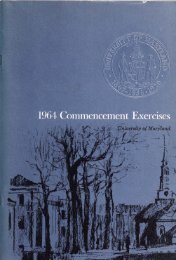1961 US Commission on Civil Rights Report Book 2 - University of ...
1961 US Commission on Civil Rights Report Book 2 - University of ...
1961 US Commission on Civil Rights Report Book 2 - University of ...
Create successful ePaper yourself
Turn your PDF publications into a flip-book with our unique Google optimized e-Paper software.
latter was rejected because it presented safety hazards for little children.<br />
The court found no abuse <strong>of</strong> discreti<strong>on</strong>, saying: M<br />
[A school board] may c<strong>on</strong>sider such factors in selecting sites that it<br />
c<strong>on</strong>siders relevant and reas<strong>on</strong>able and, in the absence <strong>of</strong> a showing<br />
that the standards for selecti<strong>on</strong> are not relevant and reas<strong>on</strong>able and<br />
that in reality they were adopted as a sham or subterfuge to foster<br />
segregati<strong>on</strong>, or for any other illegal purpose, their use is within the<br />
administrative discreti<strong>on</strong> <strong>of</strong> the school board. The fact that in a<br />
given area a school is populated almost exclusively by the children<br />
<strong>of</strong> a given race is not <strong>of</strong> itself evidence <strong>of</strong> discriminati<strong>on</strong>. The<br />
choice <strong>of</strong> a school site based <strong>on</strong> density <strong>of</strong> populati<strong>on</strong> and geographical<br />
c<strong>on</strong>siderati<strong>on</strong>, such as distance, accessibility, ease <strong>of</strong> transportati<strong>on</strong>,<br />
and other safety c<strong>on</strong>siderati<strong>on</strong>s, is a permissible exercise <strong>of</strong><br />
administrative discreti<strong>on</strong>.<br />
The New Rochelle case M discussed above, started with a school board<br />
decisi<strong>on</strong> to build a new school <strong>on</strong> the site <strong>of</strong> the Lincoln School, which<br />
the court found had been deliberately created and maintained as a<br />
Negro school. Instead <strong>of</strong> issuing an injuncti<strong>on</strong>, the court ordered the<br />
board to present a desegregati<strong>on</strong> plan. The plan presented by a majority<br />
<strong>of</strong> the board was based up<strong>on</strong> existing school z<strong>on</strong>es, but included<br />
strictly circumscribed, permissive-transfer privileges. 84 No transfer<br />
would be allowed unless approved by the pupil's classroom teacher, his<br />
school principal, and the superintendent <strong>of</strong> schools; nor would <strong>on</strong>e be<br />
valid for more than a year. (Transferees could be displaced after i year<br />
by children living in the z<strong>on</strong>e <strong>of</strong> the receiving school.) The right to<br />
transfer was further limited by a board ruling as to maximum class size.<br />
The minority members <strong>of</strong> the board submitted a plan which the court<br />
refused to bar from c<strong>on</strong>siderati<strong>on</strong>. 85 It called for immediate transfer <strong>of</strong><br />
upper-grade pupils and the aband<strong>on</strong>ment <strong>of</strong> Lincoln School in igG^86<br />
Up<strong>on</strong> the invitati<strong>on</strong> <strong>of</strong> the court, 87 the United States submitted an<br />
amicus curiae brief in which it criticized the majority plan, referred to<br />
the minority plan <strong>on</strong>ly indirectly, and ignored the questi<strong>on</strong> <strong>of</strong> segregati<strong>on</strong><br />
by site selecti<strong>on</strong>. Although acknowledging that, under the sec<strong>on</strong>d Brown<br />
decisi<strong>on</strong> the suitability <strong>of</strong> a plan is to be determined by local school<br />
c<strong>on</strong>diti<strong>on</strong>s, the United States suggested that the free transfer programs<br />
<strong>of</strong> the border cities <strong>of</strong> Washingt<strong>on</strong>, D.C., Baltimore, Oklahoma City, and<br />
Louisville should be the criteri<strong>on</strong> for New Rochelle. 88 Then this crucial<br />
observati<strong>on</strong>: M<br />
... It may well be that, up<strong>on</strong> experience, it will appear that<br />
placing the burden <strong>of</strong> applying for transfers up<strong>on</strong> the Negro children<br />
is not the most effective way <strong>of</strong> eliminating the deplorable<br />
c<strong>on</strong>diti<strong>on</strong>s which presently exist. It seems quite possible that<br />
108


